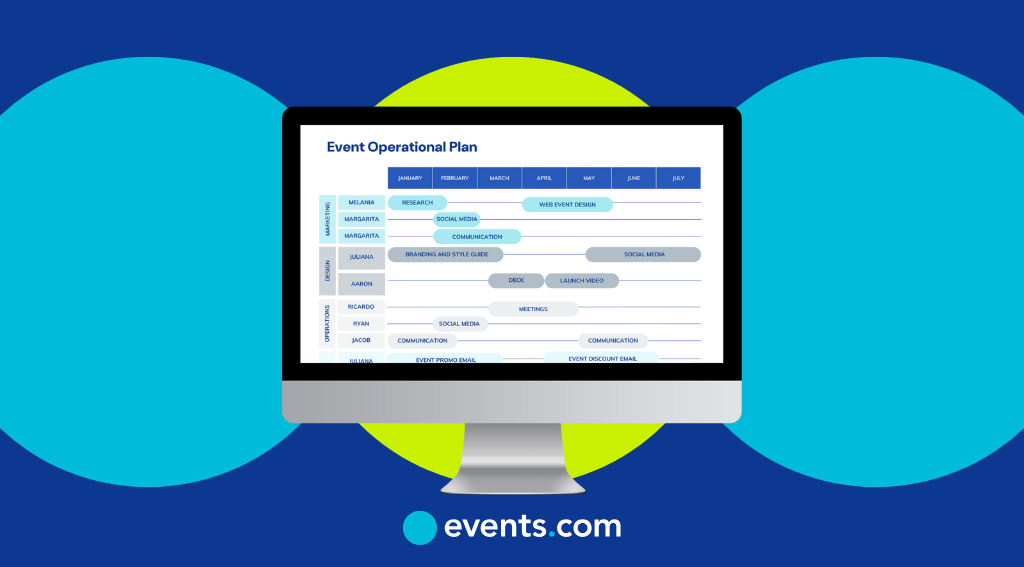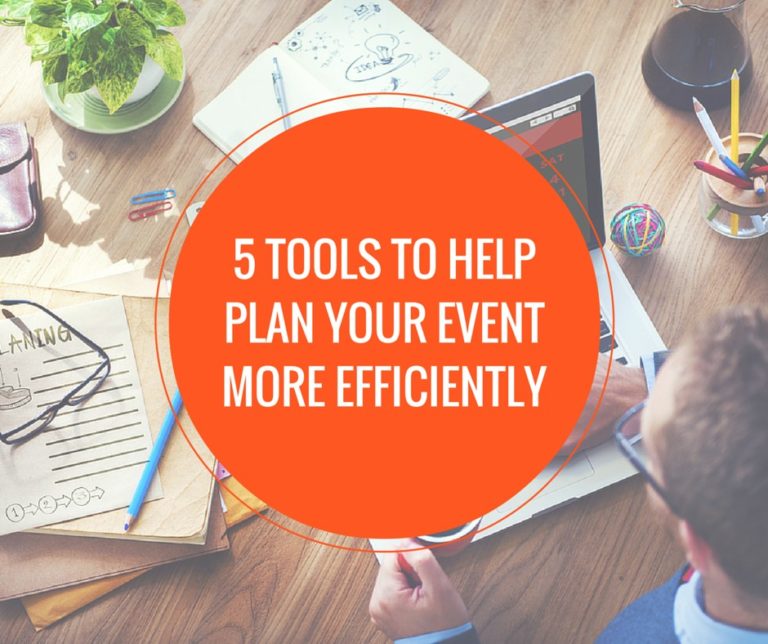Coordinating an event can sometimes feel like you’re executing a military operation. Every function has many moving parts that must line up perfectly, from budgeting to registering attendees. Juggling all these tasks requires intense focus, stellar project management skills, and often a little luck.
An event operational plan will help you stay organized and launch a successful event. This document outlines your goals, timeline, and other crucial aspects. It also includes risk management strategies if anything goes awry before or during the event. This guide covers key elements of an event operational plan and steps to design one.
Definition and Purpose of an Event Operational Plan
An event operational plan is a blueprint that maps out all the logistics and resources needed to coordinate an event. It includes a budget, marketing plan, timeline, and other essential elements of event planning.
Event operations managers create these frameworks to streamline the planning process. The operational plan requires them to outline each step ahead of time instead of making decisions as they go. This strategy improves efficiency and speed.
An event operational plan also lets you anticipate challenges and brainstorm potential solutions. For example, say you’re organizing a 5K charity run at a busy local park. Possible issues could include runners getting lost in the woods and traffic management. Once you’ve identified these challenges, you can develop strategies to prevent them, such as creating adequate route signage.
Finally, an event operational plan improves communication. Your team members can refer to this framework as they work on different aspects of the function. This process prevents costly mistakes, such as booking the wrong vendors or forgetting to send event tickets to attendees.
Key Components of an Event Operational Plan
An event operational plan has a lot in common with a business plan. Both frameworks describe where you want to go and the steps you’ll take to get there.
Your event management plan should include these fundamental elements:
- Event goals: Create specific objectives for your gathering. These goals will guide your decision-making throughout the event planning process.Â
- Budget: Develop a thorough financial plan with expenses and expected revenues. Divide the budget into categories, such as catering, marketing, and venue fees.Â
- Key milestones: Specify when you plan to accomplish important tasks, such as getting event permits and opening ticket sales.Â
- Necessary resources: Estimate the type and amount of resources you’ll need for each phase of the event plan. For instance, you may need 200 signs to guide attendees around the venue. Large events may also require a team of staff members and volunteers.Â
- Event staff duties: Decide how many team members you need and define their responsibilities. For instance, you could hire a social media manager to promote the event on Instagram, TikTok, and other platforms.Â
- Accessibility plan: Create methods to accommodate guests with disabilities, language barriers, and other needs. This plan could include hiring a translator and reserving accessible seating.Â
- Promotional activities: Outline strategies to market the event and drive attendance.Â
- Potential risks: Assess obstacles you may encounter before, during, or after the event.Â
- Key performance indicators (KPIs): Identify metrics that you’ll gather and analyze to measure your event performance. Useful KPIs include number of attendees, merchandise sales, and return on investment.Â
Customize this template as needed for your unique events. For instance, you might add a transportation section to plan how attendees will enter and leave the venue. Some events will also require safety regulations, security, and technology plans.
How To Develop an Event Operational Plan
Mapping out your event operations can seem daunting, especially when planning a large or complex gathering. But don’t worry. By following these easy steps, anyone can create an effective and thorough event plan.
Define Your Goals and Objectives
Start by setting clear goals and objectives for your event. Follow the SMART framework by creating goals that meet these criteria:
- SpecificÂ
- Measurable
- Achievable
- Relevant
- Time-boundÂ
For example, you could aim to generate $20,000 in merchandise sales during a two-day event. Other goals may address attendance, engagement, public relations, and sponsorships.
These outcomes should align with your overall organizational goals. Suppose, for example, your organization aims to build its brand reputation and grow revenue. Relevant event goals could include achieving high attendee satisfaction scores and selling 1,000 tickets.
Assemble Your Team
Even the most experienced event coordinators often need help planning and executing functions. After all, you can’t be in ten places or manage five tasks at once.
Choose team members with different areas of expertise and delegate responsibilities. Depending on the size and type of event, you may need these key players:
- Event operations manager: Plans and oversees the big-picture logistics for the entire event, from choosing vendors to managing the budget
- Event coordinator: Handles the everyday tasks needed to plan the event, such as registering guests and communicating with vendorsÂ
- Finance manager: Controls expenses and revenue, approves contracts, and manages cash flow
- Marketing specialist: Develops strategies to promote the event through digital and traditional channelsÂ
- Security manager: Creates safety protocols and responds to incidents during the eventÂ
- Volunteer manager: Recruits, trains, and supervises volunteersÂ
Create a Detailed Timeline
Developing a comprehensive timeline will help you plan your operations and stay on schedule. Start by pinpointing the date of your event and work backward to identify key milestones you’ll need to reach along the way.
Lay the groundwork for your function during the early planning phase. This stage involves brainstorming the overall vision for the event and define your target audience. Other milestones include reserving a venue and creating an event team.
Next, you’ll handle all the tasks needed to prepare for and execute the event. Key milestones for this stage may include designing branding, hiring vendors, and launching a marketing campaign.
Finally, the timeline should have a post-event phase to clean up and assess the event’s performance. Set deadlines for collecting feedback from attendees and creating a post-event report.
Secure the Venue and Resources
Choose a venue as early as possible in the event production process. Your chosen location will determine the event’s atmosphere, layout, and target audience.
Research locations carefully to find the right spot for your function. Consider accessibility, the expected attendees, parking availability, and other factors. Popular venues tend to book far in advance, so act quickly once you’ve identified a suitable venue.
You’ll also need to obtain equipment, staff, and other resources. Compare quotes from suppliers and negotiate contracts. For example, a catering company may agree to discount their rates if you agree to hire them for future events. Additionally, you should develop training resources to get new hires and volunteers up to speed.
Develop a Marketing and Communication Plan
Designing a marketing campaign is one of the most crucial operations in event management. An effective marketing strategy will intrigue your audience and leave them eager to attend your upcoming event.
Start by researching your target audience and their preferred communication channels. For example, teenagers may favor TikTok ads, while Gen X could respond best to email marketing. Next, define your brand personality and create promotional materials that resonate with prospective attendees.
Manage Logistics and Operations
Your event operations plan should describe all the nitty-gritty logistics needed to plan and run your function. Many of these operations will fall under the event coordinator’s responsibilities and may include:
- Applying for event permitsÂ
- Creating a website and online registration form
- Hiring vendors to design and sell merchandiseÂ
- Scheduling vendor deliveriesÂ
- Sending reminder emailsÂ
- Setting up a payment portal for event ticketsÂ
Develop a Risk Management Plan
Identify potential risks that could affect the success of your event. Brainstorm these threats by reflecting on challenges you’ve encountered during previous events. You can also network with other event planners and ask them about the risks their event programs have faced.
Next, create a detailed plan to prevent or mitigate each risk. Say, for example, you’re coordinating an outdoor music festival in the summer. You could reduce the risk of health-related emergencies by handing out free water and having first aid stations on-site.
Estimate All Event Expenses and Create a Realistic Budget
The budget is an essential component of every event operational plan. Effectively managing your finances will help you maximize your revenue and avoid wasting money.
Create a list of expected expenditures for your event and their costs. Get estimates from caterers, vendors, and other suppliers to predict these expenses accurately.
Use these estimates to formulate an event budget. Prioritize expenses that will help your gathering run smoothly. For example, a festival may need to buy wristbands to track attendees, while a concert may require top-notch speakers. Revisit your budget frequently to make sure you’re on track and make adjustments as needed.
Ensure Event Success Today
Running an event planning business requires careful attention to detail and advanced project management skills. Developing a thorough event operational plan will allow you to coordinate your next function more effectively. Take your operations to the next level with Events.com’s event management software. Our tools will help you streamline the planning process, analyze your performance, and boost attendance. Get a free demo to learn more about our cutting-edge features and support resources.




